 |
 |
 |
 |
 |
 |
 |
The Transgender Revolution - Part III
The Insane ‘Otherkin’ Identity &
the ‘Furry’ Frenzy
While not as common as identifying as LGBTQ+, there are growing numbers of people, particularly youth, who reject the identity of being human altogether. And of course, this identity is being taken very seriously by the LBGTQ+ mafia and the woke crowds.
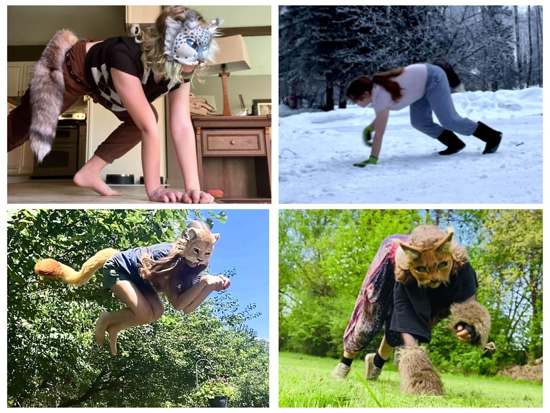
Animal-identifying (“therian”) youth, spending their spare time practicing prancing & jumping like animals (“quadrobics”) while wearing animal masks & tails.
As if “gender identities” were not stupid enough, prepare for the “non-human” identities! Here is an attempt to explain this latest craze of the youth:
- “Otherkin” is the umbrella term for people who identify as either “partially” or “entirely” “nonhuman.” Another word used for this identity is “alterhuman.”
- “Otherkin” people often believe they are “non-human” in a “spiritual” or “psychological” way.
- “Otherkin” people normally admit that their physical body is human, but they usually believe that their soul is not human, either in part or entirely.
- “Otherkin” people often attribute their “non-physical” identity to causes such as
reincarnation, past lives,
parallel universes,
“species dysphoria,” etc. While not all “otherkin” people believe they had “past lives,” many do and they can discover their “past lives” through “meditation” and/or
dreams.
- Many “otherkin” people struggle with what has been termed “species dysphoria,” which is a psychological disorder where people are uncomfortable with their
human bodies. This is similar to “gender dysphoria,” which I addressed in previous articles. The fact that these illusions are being considered important enough to deserve official terminology already explains how far this new madness has gone.
- According to the “otherkin,” being “otherkin” and having a “non-human” soul is something you do not choose and cannot change. They are often “born” with the “non-human” soul, just as the transgenders say they were “born” in the wrong body or the homosexuals insist they were “born that way.” It is an “integral” identity.
- “Otherkin” may fully identify (non-physically) with their “otherkin” identity (e.g. “I am entirely a wolf inside”). Or, they may believe they have a human persona and then a second persona that is their “otherkin spirit” (e.g. “I am human but I also have the spirit of a wolf”). “Otherkin” people may also have multiple “non-human” identities.
- Some “otherkin” people report “shifting” psychologically or spiritually into their “otherkin” spirit, where they lose their human side for a moment and let the “non-human” spirit take over, in an experience reminiscent of the werewolf, or even a demonic possession.
- “Otherkin” people may identify as real or mythical creatures, or creatures from fantasy and popular culture.
such Identities include but are not limited to: animals, angels, demons, dragons, elves, fairies, aliens and even cartoon characters. You can identify as anything you want, even if it is not real (e.g. a fictional character) nor a living creature (e.g. a doll). These “otherkin” identities are called “kintypes.”
- Many “otherkin” people report experiencing what are called “phantom shifts.” Similar to the phantom feelings an amputee may have of a limb that has been removed, an “otherkin” person may feel a part of the body of their “kintype” that does not physically exist, such as a tail, animal ears, wings, hooves, etc. Clearly, in such cases we are dealing with madness.
- People who identify as “otherkin” also often identify as LGBTQ+. Many “otherkin” people identify as homosexual, “transgender” and/or “non-binary.” Some “otherkin” people are “zoophiles” (people who are
attracted to animals), and some even participate in acts of bestiality.
However, bestiality is not openly accepted by the “otherkin” movement since it is considered by many to be “animal abuse”; notwithstanding, there is a noteworthy tendency to embrace this heinous action.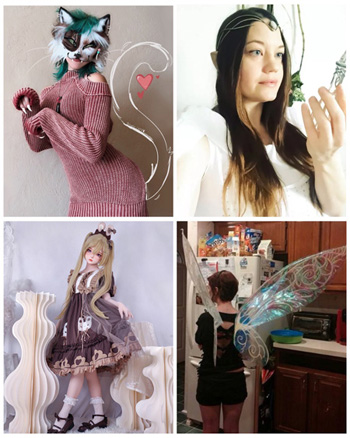
Different types of “otherkin”: Top left, a “Therian” girl named Opal who thinks she is a cat; top right, an “elfkin” woman named Kimberel who believes she is an elf sent to help humanity; bottom left, a “dollkin” girl who believes she is a doll & wears a doll mask; bottom right, an example of the “fairykin” who believe they are fairies
- The “otherkin” has a variety of ways to express their “identities.” Their choices of clothing, accessories, makeup, tattoos, body modifications, mannerisms and more are not just “costumes” to them – they are serious matters.
Some choose not to dress up as their “otherkin” identity, but appear as a “normal person” who just has an interior “non-human” identity. Many “otherkin” people will wear animal collars, ears, tails etc. when in public. Some are so committed as to wear full-time masks and to make extreme body modifications to better express their animal selves… - As noted above, identifying as “otherkin” does not necessarily mean that these persons cease to participate and present in society as a human. Generally, the “otherkin” people still walk on their two legs, speak normally, go to school and work, and so on.
On the other hand, there are some children who enter fully into the animal person (e.g. a girl who thinks she is a cat will only speak in meows). Each “otherkin” is free to express their “identity” however they see fit.
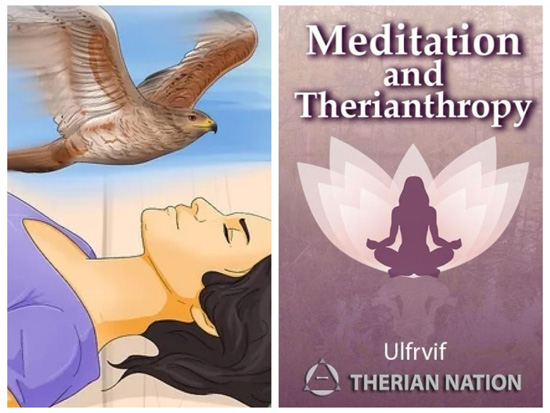
Left, a “therian” woman has a dream where she “shifts” into her animal self; right, a book giving meditation advice for “therians”
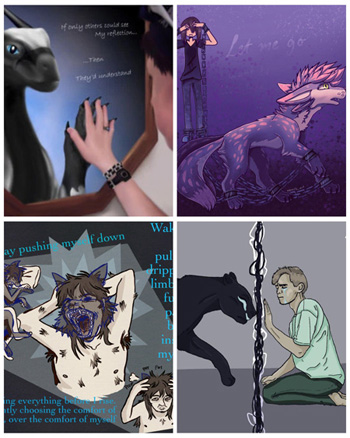
In the art of “otherkins” they visually represent their struggles with “species dysphoria” and express their discontent caused by the supposed “clash” between their human bodies and their “non-human” souls
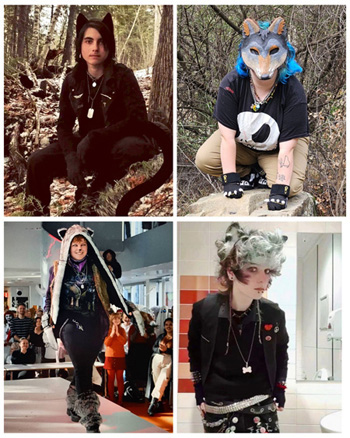
Examples of “otherkin” “therian,” people who identify as animals: Top left, “Ryuuko,” a man who identifies as a “pagan” “tomcat”; top right; a girl who renamed herself “Jack” & calls herself a “disabled therian & otherkin” transgender with “he/it/xe” pronouns; bottom left, “Thorn", a female “therian” “non-binary” influencer “they/them” who identifies as a wolf and a betta fish; bottom right, an “emo”/punk male-identifying bisexual polyamorous “werewolf therian” with pronouns “it/he/dog”
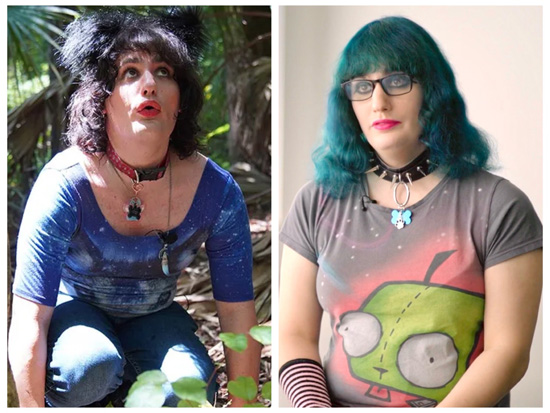
Pictured above is “Naia the Wolf Girl,” a notorious transgender “otherkin therian.” Not only does he believe he is female, but he also affirms that “on all levels except physical, I am a wolf.”
There are two notorious and similar groups of people who identify with animals. They are often confused, because they seem so similar. They are the “therians” and the “furries.”
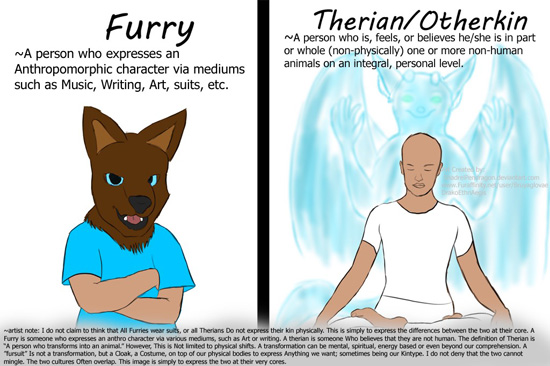
A chart that explains the difference between “furries” and “otherkins/therians”
1. Therians
“Therians” fall under the “otherkin” umbrella. A “therian” is a person who non-physically identifies as an animal (or multiple animals).
“Therians” often have “species dysphoria,” believing that they were an animal in their “past life” (or lives), and some even have zoophilia (sexual attraction to animals).
“Therians” often will still dress and interact with the world as “normal humans,” but may choose to wear animal tails, collars, ears, masks, clothing with their animal on it, either part or full time. Again, as with all the disorders I have described (here and here), it all depends on what the individual wants to do. The most extreme “therians” may go so far as to modify their bodies to reflect their “animal identity” through tattoos, piercings and surgeries.
“Therians” often study the animal they identify with and practice their habits. For instance, “canine” and “feline” therians may practice their “quadrobics” - prancing and jumping on all fours. They may also make their animal noises and imitate the mannerisms of their “chosen” animal(s).
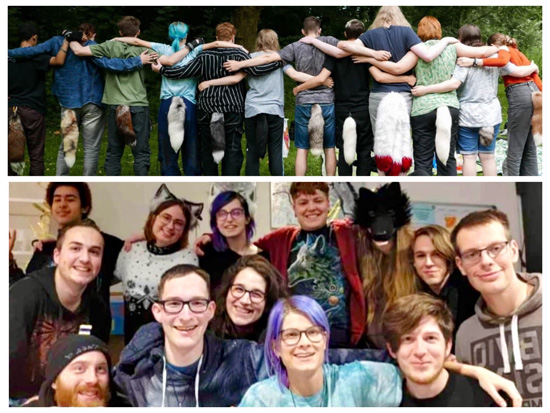
Groups of “therians” and “otherkins” who meetup in the Netherlands
“Furries” are an infamous group of people who are “fans” of animal characters that act like humans, and they enjoy expressing themselves as humanized animals. Unlike “therians,” “furries” do not necessarily identify as animals.
“Furries” often create what is called a “fursona” (a play on the word “persona”). A “fursona” is an animal character a “furry” makes up which a “furry” feels “represents” himself/herself in some way. While “furries” do not identify as this “fursona” character, it is still an “expression of self.” A “furry” often will make art, write about, and dress up as his/her “fursona” character.
“Furries” tend to be more social, and they enjoy wearing “fursuits” part-time or even full-time. They often like to go to “furry” conventions and have meetups.
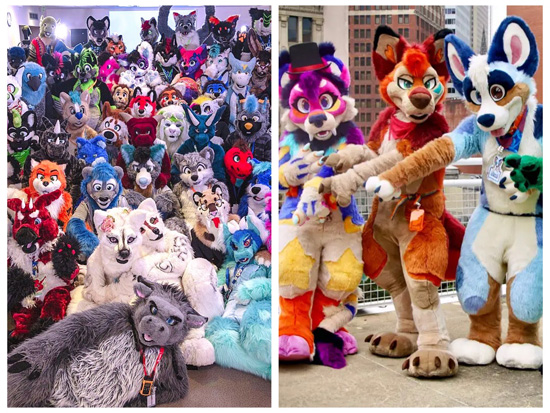
“Furries” enjoy creating humanized animal characters & dressing up as them in “fursuits.” They like to meet up at conventions.
“Therians” & “Furries” who take their identities to the extreme
Worthy of mention is the extreme to which some “therians” and “furries” take their affinity with animals.
Many “furries” and “therians” have spent thousands of dollars on their highly expensive “fursuits.” The starting price of “fursuits” is at least $1,000 dollars, and the cost can rise to $20,000. For example, the Japanese man known as Toco spent $14,000 on his realistic collie suit; he asserts he has always dreamed of “becoming an animal,” although he has still not “come out” as a “therian.”
Some have gone so far as to actually modify their bodies to reflect their identity, through tattoos, piercings and surgeries. Noteworthy examples include the “Stalking Cat,” who held a world record for the “most permanent transformations to look like an animal.” Another would be the “Lizard Man,” who does not identify as a lizard but has a great admiration for them.
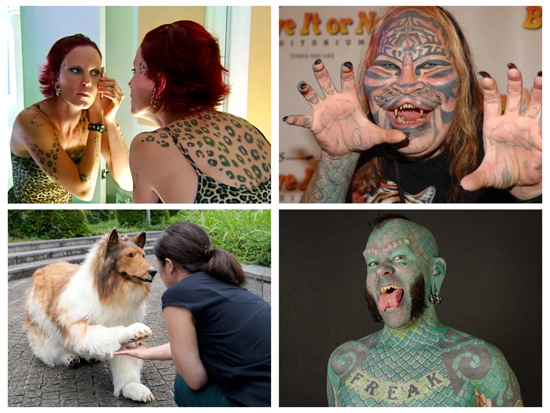
Extremists in adopting animal identities/affinities: Top left, Beki Buelow the “Leopard Girl”; top right, the “Stalking Cat” born Dennis Anver; bottom left, Toco, a Japanese man in a realistic collie suit; bottom right, Erik Sprague the “Lizard Man”
A friend told me the story of a student in school who called herself a squirrel and demanded to be acknowledged as such. Instead of sending her to a mental institution, her teacher affirmed her “identity” and insisted that her fellow students take this mentally deranged girl seriously, and refer to her as a squirrel. These are the times we are in – every kind of madness and attack on Natural Law is not only permitted, but encouraged.
I can only wonder if this “non-human” identification madness is some kind of devilish possession, like the werewolf.
In the next and final article, I will look at “otherkins” who identify as outright demonic creatures, which is the ultimate end of the identity madness.
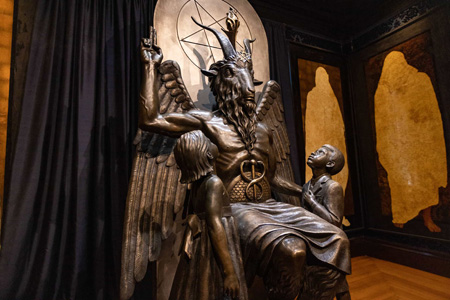
The
Baphomet – not only is it “male and female,” but also “half human, half animal.”
Is the devil's goal to have men resemble this idol?

 Volume I |
 Volume II |
 Volume III |
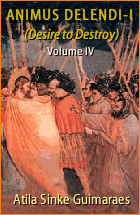 Volume IV |
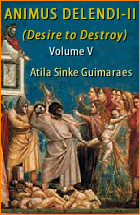 Volume V |
 Volume VI |
 Volume VII |
 Volume VIII |
 Volume IX |
 Volume X |
 Volume XI |
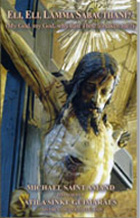 Special Edition |


